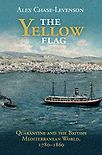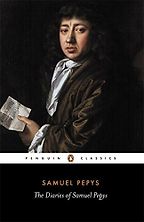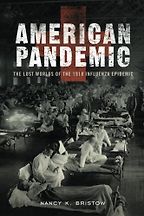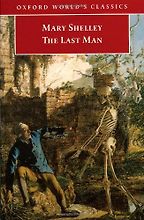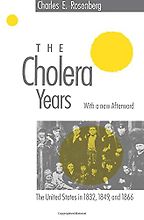You’ve selected five books about those who lived through past epidemics and pandemics to offer some historical context for the moment we find ourselves in now. Your own book, The Yellow Flag, is about the use of quarantine in the Mediterranean in the 19th century. What a time to be launching such a book!
You know, it’s so odd to me to see so many parallels between the world we’re living in now and a world that really did seem to be over. My book is mainly about the first half of the 19th century, but we’re hearing the same debates today that existed then about the ethics of quarantining, about the balance between personal freedom and state responsibility to protect the general population. We’re also seeing significant uncertainty about the disease at hand itself: the lack of agreement over basics like how long this might last, exactly which activities we need to avoid, how long people remain immune after they’ve recovered, how many asymptomatic carriers are there. All of these questions being worked out in real time, and we’re all trying to make our way through contradictory opinions, contested facts, and contrasting models.
Certainly, epidemic diseases in the period I studied were the subject of debates. These show a medical community that was very divided and yet conscious that it was essential to retain some sort of consensus to bolster professional credibility at a time when the medical profession was attempting to elevate itself to play a greater role in political decisions. All told, yes, there are tons of parallels.
Until recently, I think many of us had a false sense of security inasmuch as we felt that medicine was so advanced that we weren’t vulnerable to an epidemic in the same way as they might have been in the days before they understood what a virus is. Yet along comes a novel coronavirus and we find ourselves using age-old tactics: banning gatherings, shutting the shops.
Absolutely! How much does it really help us to be able to name something, or to be able to see an image of it? The period I study is before the advent of bacteriology, let alone virology. People couldn’t visualise diseases in the way we can now: as a particular entity associated with a specific bacterium or virus.
At the same time, the effort to pin down what symptoms are, to suss out who is infected with the disease and who is vulnerable—that is something very familiar. In a way, the sort of scrambling that public health officials are doing now is what governments had to deal with in the past when any new epidemic threatened a society. Similar calculations, similar fears, similar uncertainty.
Get the weekly Five Books newsletter
Medicine has advanced, of course, and treatment has advanced. Undoubtedly, fewer people will die now than would have if this had happened before there were ventilators. But it’s striking to realise how much we’re still at the whim of the natural world and obligated to grapple with uncertainty when something new arrives.
You have written that “forcibly ordering people to withdraw from the rhythms of everyday life seems at once intrusive and extraordinary.” Lockdowns of the sort we’ve been experiencing in Europe and in Asia, and the shelter-in-place orders we’re seeing in the US, would have been unimaginable only a few weeks ago. Could you tell me about the quarantine system you have studied, and compare and contrast it with what we are experiencing?
Yes. It’s often said that the coronavirus quarantines that have been enacted this year have been the largest in world history. That might be true in terms of the number of people caught up in them at one time. But I think the scale of the system I write about is actually far larger. When we realize the logic and ambition that underlay it, it’s all-encompassing and hard to imagine in the modern world.
So, this quarantine system operated on the assumption that the bubonic plague had essentially stopped hitting Western Europe after the 1720 plague of Marseille and the 1744 plague of Messina. After the mid-18th century, there was a real epidemiological divide between the Middle East and North Africa, where there were still periodic major plague epidemics, and Europe, which was plague-free. Of course, hundreds of thousands of Europeans died of other epidemic diseases, but plague struck many as a special case. This divide—East/West, plague/no-plague—led to what I’m calling a ‘universal quarantine system’ that applied even in times of good health. Under this system, every single person, item, ship, letter, everything moving from the eastern Mediterranean or North Africa had to be quarantined.
And these quarantines lasted a long time. On average, in this period, about three weeks, and that’s in a time of good health. If there were any reports of plague cases in a city from which the ship left, the quarantine would be 35 or 40 days. During that time, people had to live in a lazaretto—an isolated building that was essentially a military fortress outside a Mediterranean port city or a frontier crossing on the Austrian-Ottoman border. Quarantine in such a place was an evocative episode for anyone who experienced it, and what’s interesting about it is it affected everyone—very rich elites as well as very poor people.
“Every single person, item, ship, letter, everything moving from the eastern Mediterranean or North Africa had to be quarantined”
Sailors, soldiers, and fishermen comprised the majority of those subjected to quarantine, but much of the writing we have about quarantine is from elite travellers, who often found it unexpectedly comfortable because they could rent very nice furniture and pass the time reading newspapers and writing. At the same time, even for these travellers, it was disorienting and scary, and it induced hypochondria.
The logic of this system was that any one port enforcing quarantine had a board of health that would correspond with other boards of health in different countries, and constantly inquire as to what their procedures were. If there was a sense that they were not up to snuff, ships from that port—even if it were in Western Europe—would be quarantined. In 1825, for example, Britain passed a reformist Quarantine Act, and until the Privy Council could assure Mediterranean powers that the rules hadn’t really changed, all ships from Britain going to Italian, French, and Austrian ports were put in quarantine as if they had come from the Middle East.
The 19th century was a period of globalization and trade and travel, but on a smaller scale than today. Imagining that kind of system now—quarantine of an infected area, and quarantine against every other country in the world that did not also impose a quarantine on that area, with no exceptions—would be beyond what I think most governments have contemplated.
Interesting. This word ‘unprecedented’ keeps popping up in the political discourse at the moment, but what your book choices suggest to me is that there are in fact precedents. I don’t know why I find that reassuring, but I do. I suppose it’s the sense that society has come through this, and worse, before.
Yes. Almost all epidemics have more survivors than victims. People pass the time during an epidemic not necessarily always and exclusively thinking about the disease at hand; they make jokes, play games, selectively ignore the sickness. Many people have looked back on living through an epidemic as something that was not necessarily totally destabilizing. At a time that really does feel unprecedented in our own lives, remembering that we might emerge from this and not think of it as the single most dramatic period that we’ve lived through, and that many routines will be resumed afterwards, yes, that’s reassuring. As much as we hope this experience leads to positive changes, in some ways, it’s refreshing to see what hasn’t changed after major epidemics in the past. Historians have argued, for example, that one of the reasons the Spanish flu can feel like a “forgotten” episode is because it actually changed so little.
Let’s talk about our first book that charts the experience of living through an epidemic: The Diary of Samuel Pepys. Pepys recorded his experiences of living through the Great Plague as it hit London in 1665.
Pepys is a really great person to follow through an epidemic. He records day by day what it’s like to live in a plague-stricken city, and shows us the intertwining of things that are normal and things that are surreal. The plague filters in and out of his narrative.
In some entries, he seems totally unaware of it; he doesn’t talk about the plague. But other entries detail his fear that he himself will die and he doesn’t know what will happen to his estate.
He describes lurid scenes of walking through the streets of London, of seeing people with plague sores, and of being told that many doctors have died. He asks ‘what will become of us,’ and then in the same entry tells us that he proceeded on to a dinner party where everyone was in good cheer. I don’t think this is because Pepys was a particularly callous person. It’s because that juxtaposition of fear and forgetfulness is, in many ways, what it is like to live through an epidemic. It’s always there, smouldering beneath the surface, but it’s not necessarily all-encompassing.
“That juxtaposition of fear and forgetfulness is in many ways what it is like to live through an epidemic”
You know, it’s interesting from that perspective to compare Pepys to fictional portrayals of the same plague. For example, I’ve taught Pepys alongside Daniel Defoe’s A Journal of the Plague Year, and it’s clear that in the fictional portrayal, the plague really is all-encompassing. The plague is what the narrator engages with every day. But the way Pepys keeps intertwining his daily experiences that have nothing to do with the medical context and observations of death, destruction and fear, I think, captures something more real about living through an epidemic.
In fact, Pepys’ cheerfulness is calming at a time when many of us feel so anxious. Maybe the fact that there wasn’t 24/7 news available to Pepys is what allowed him to retain so much equanimity. Maybe it could be a reminder to disengage from constant coronavirus coverage.
That sounds like a good idea. Coincidentally, I finished Camus’ The Plague a week or two before the Wuhan lockdown began. I haven’t been able to stop thinking about its opening section, when all they ever seem to do is sit around in cafes and smoke as the epidemic is taking hold. There were so many parallels to how people reacted in real life—all that carpe diem, last-drinks-before-the-bars-close socialising before the mood turns, then later the boredom and resentment that seem to echo what a lot of people are feeling now.
I agree. The boredom, that sense of being stuck. We only later realise that Dr Rieux is the narrator of that book, but he is irritated by that behaviour and also totally understanding of it. The way things only gradually change in this fictional plague-stricken Oran, but then start to change quickly feels very relatable now.
I thought about recommending that book too, and it’s certainly telling that Camus alighted on living through an epidemic as an ideal stage for an examination of the more general struggles of human existence. But again, as with Defoe, the plague is so overwhelmingly the center of attention in this work of fiction. The sense of claustrophobia in that book, the way the city is totally shut-in … I think that’s part of why I thought Pepys might be a calmer narrator to follow an epidemic with! Yes, easier reading at this time.
What’s the best format to read the diary in? It’s available as a Penguin Classic—and, I’m sure, in hard copy from other imprints—but you can also browse it for free online.
When I’ve taught it, I found it can be a bit choppy to read the entries online, one by one. I personally like the feeling of getting to turn the page and see what happens. But it does work in all formats, and the free online version has some excellent explanatory notes.
Okay. Your second book choice jumps forward in time. This is Nancy Bristow’s American Pandemic, which charts the 1918 influenza epidemic in the United States. I was interested that you chose this particular book, as it was recommended in our interview with Christian W McMillen on the best books on pandemics only recently. What makes it so good?
What Nancy Bristow manages to do is really capture the way in which there isn’t one general American experience of the 1918 flu—that the many ways people experienced it constitute ‘lost worlds’ rather than one, neglected national history of a ‘lost world.’ She begins the book by talking about her own family connection to Spanish flu: she had two great grandparents who died, and her grandfather was orphaned, something she only learned as an adult. Thinking about how that once unknown, discrete, family story is part of a broader, global event—one lost world—is a very effective way to set up a history that talks about a global pandemic at many different levels: personal, local, regional, and national.
Bristow considers the pandemic from a variety of angles, pondering how life changed in ways that varied based on class, gender, profession, race, and locality. She’s thinking about what kinds of events were cancelled, what sorts of disagreements doctors had, how doctors and nurses diverged in their reactions, how cities grappled with various practical problems—some of which, very unnervingly, we’re seeing again: morgues filling with bodies, not knowing how to deal with funerals, that kind of thing.
What also makes Bristow’s work resonate now is the way she focuses on how ad hoc the response was. Officials and doctors had to adjust as time went on. That gets at something frustrating I’ve found with coronavirus, which is that it’s hard to settle into a routine when the rules keep changing. Even when you think they’re at their most severe, there still are tweaks; you feel constantly unsettled. I think that certainly comes across in Bristow’s work.
“City officials didn’t want to acknowledge how bad it was, and were resistant to cancel events”
During the short, sharp shock of the flu—the most intense period was the so-called ‘second wave,’ the relatively short period in the fall of 1918, when cities really saw astronomical death rates—she shows us how city officials didn’t want to acknowledge how bad it was, and were resistant to cancel events. Events were only cancelled in a very non-systematic way.
We keep comparing the current crisis to that epidemic, I think more than any other. That’s definitely part of the reason I think it’s instructive to read and think about Bristow’s book. It’s full of rich anecdotes, dizzyingly so. As a book, it really is making a conscious effort to include the perspectives not just of government officials, but of doctors and nurses, women and men. Bristow takes pains to emphasize not just that an African American family experienced the 1918 pandemic differently to a middle class white family, but how that was so. She tries to include as many perspectives as possible, and I think that’s what makes this an excellent book.
What strikes me as an interesting parallel is that we are again seeing the attaching of a foreign nationality to the disease that endangers us. Was it bigotry that led to the disease behind the 1918 epidemic being called ‘Spanish flu’?
I don’t think ‘Spanish flu’ was endowed with so much racial dog whistling as, for example, Donald Trump’s insistence on calling Covid-19 ‘the Chinese virus.’ I believe the conventional reason given for why it was called the Spanish flu is that news during the war was less censored in Spain, so reports about influenza were particularly detailed there. People thought, okay, it must be coming from Spain.
Actually, we could think about another disease, syphilis, to get a good sense of the intense politicization of naming things. It’s not an accident that that malady was called ‘the French disease’ in Britain, the ‘English disease’ in France, and ‘the Spanish disease’ in Italy. It’s never obvious what to call something, and controlling that narrative is difficult. That’s why it’s problematic when someone’s actually making an effort to keep insisting that, you know, this is a Chinese virus, even now that the US has surpassed China in terms of the number of cases.
Your next book recommendation on life in an epidemic is a work of fiction: Mary Shelley’s The Last Man. This is nothing less than a post-apocalyptic vision!
It’s pretty dark. You know, one of the things that I actually find paradoxically comforting about The Last Man is that it’s so much worse than even the worst predictions about coronavirus. But while The Last Man is a work of fiction, it does capture some central ideas about epidemics that were ubiquitous in the early nineteenth century. Something that Shelley’s central band of characters temporarily try to console themselves with, for example, is a sense that the epidemic wouldn’t spread from tropical countries, or from the Middle East, to Western Europe. Clearly she’s influenced by the logic of the quarantine system! The characters tell themselves the plague is native to the tropics and therefore cannot exist in cold countries.
In other ways, Shelley’s novel, apocalyptic though it is, captures quite well some of the reactions we’re hearing now to coronavirus. You know, one politician featured in The Last Man keeps trying to ignore it, insisting on the social program he had come up with beforehand, finding it hard to reconcile himself to the changed atmosphere of the pandemic. There’s a messianic figure who convinces his followers that they are immune to the disease, and others who claim that it’s all a hoax.
That sounds familiar.
The final point I want to make about The Last Man that makes it—even as fiction—a fascinating lens into what it was like to contemplate life during an epidemic in the early 19th century is that Shelley spent a lot of time in Italy during a period that really was one of the darkest times for disease in the Mediterranean. Bubonic plague epidemics, starting in the decade before she wrote—the 1810s—started to ripple across the Mediterranean. Istanbul had one of the worst plague epidemics in its history in 1813. A plague spread from the Middle East, probably from Egypt, to Malta (then a British colony) in 1813, as well, and another British colony, Corfu, in the Ionian Islands, had a plague epidemic in 1816. Plague reached the coast of southern Italy in 1815, then Mallorca in 1820. And there were terrible yellow fever epidemics in the early 1820s in northern Spain.
Right. And The Last Man was published in 1826.
Yes. So, a few years after Shelley left Italy, but presumably within easy memory of what it was like to be in close proximity to locations stricken by serious diseases. I think she absolutely would have been aware of the palpable fear that epidemics elicited in Southern Europe. Dealing with that kind of fear, and warning about it via this apocalyptic vision she has in this book, The Last Man, might be her own reaction to living through a period where epidemics were constantly in the news.
Yes. It’s interesting that, on publication, critics felt that the concept was tired, that it had been done already. So clearly she was not the only one processing plague paranoia in this way. And at the moment, we see this run on books like The Plague and A Journal of a Plague Year and films like Contagion and 28 Days Later … I wonder why we are drawn so perversely to worst case scenarios like these. Is it a source of solace, somehow?
It’s hard to say. I’m not sure what I think about that. When Shelley wrote this book, it was after the death of her husband, after the death of two of her children. It’s a melancholy story, and I think it comes out of her own sadness. She has a small band of characters, many of whom are overtly modelled on friends and even family. Percy Shelley has a clear analogue in the book. Ruefully noting the breakup of that small band of people surely was part of what she was doing here.
I’m not sure that in 1826 she was necessarily freaked about epidemic disease, but I do think the frailty of humans in the face of events that that they can’t anticipate or plan for—and against which their ideas and philosophies and ideologies seem kind of stale—are themes in The Last Man that come out of her experiences of the last decade of her own life.
Let’s talk about Charles Rosenberg’s The Cholera Years, a book about 19th-century cholera epidemics in the US. Why do you recommend it?
Well, Rosenberg’s book isn’t new, but it’s a classic of medical history, and it’s a fun read. Much like Bristow, Rosenberg devoted a lot of research into incorporating quotations from a huge range of sources. So, medical reports, but also sermons and political speeches and diaries.
It fixates on one city—New York—through three different cholera epidemics, so you can see change over time. You can see cholera going from being seen as a divine punishment, a dreaded disease against which people had no defence, to something that, by the 1860s, seemed to be a signifier of inadequate public health infrastructure. He shows how it moves from a religious framing to a scientific or political one. But that’s not to say he’s suggesting people became secular by the 1860s; he shows how preachers, ministers and their sermons, started casting cholera as a problem for society and governments rather than a bolt of lightning from God. That transformation is interesting.
Five Books interviews are expensive to produce. If you're enjoying this interview, please support us by donating a small amount.
Reading Part I of that book (about the first cholera epidemic) in the time of coronavirus is especially evocative and interesting. There are a huge number of parallels. He talks about the growing popularity of this movement called Thomsonianism, which was a kind of do-it-yourself school of natural medicine that had a resonant appeal in Jacksonian America. That’s something we’re starting to see again, though without a formal doctrine this time; people are casting about for all kinds of remedies. In 1832, as now, elite figures recommended treatments that, after some thinking, sound crazy. To give you an example from Rosenberg, a New York Medical Board member suggested that victims of cholera should actually insert beeswax into their rectums to stop diarrhoea.
No!
It’s an absurd idea. But it reminded me a lot of the news recently. I think it was a Florida county commissioner who said he had been told that coronaviruses can live in nasal passages because they’re relatively cold … and so he started recommending that people take hair dryers and blow them up to their nostrils.
Absurd, but I can half-understand where it’s coming from. There’s a logic behind it: everyone, from all different backgrounds, is casting about for something they can do themselves in the face of an unknown disease. Homemade prophylaxis seems very appealing! And at a time of uncertainty, the idea that there could be some easy cure seems tantalizingly possible. It’s a moment where, perhaps, the medical profession loses a bit of its prestige, because they aren’t able to give answers to clear questions like: how can I treat myself if I happen to get this disease?
I can see that. Although some parts of the US and Europe are still very religious, it’s been interesting to see this type of thinking and superstition bubbling up in more secular times. I’ve also seen a quasi-moral question arising: people wondering whether we’ve been living wrongly, and if so concluding that this pandemic is some kind of correction. Often environmentalists, but not always.
It’s really interesting to think of parallels for modern moral movements—the way a discourse of sin and repentance filters into any sort of big natural disaster in this way. For example, people pointing out the way in which Covid-19 seems to have spread via air travel, and air travel is a major contributor to climate change. You can say, you know, ‘this is a corrective’ to a world some argue is too accustomed to constant movement.
Even in more prosaic, practical terms—the diminution of the public health infrastructure, the cutting of hospital beds, the lack of planning—all of this can be written about in a way that draws on religious or moral language.
Yes. Okay. Let’s get onto our final reading recommendation, Eothen by Alexander Kinglake. Kinglake is best known for his history of the Crimean War. This is a previous book, an account of travels in the Levant. What can we take from it about living through an epidemic?
Kinglake’s travel narrative comes up for a lot of legitimate criticism, such as in Edward Said’s Orientalism, for having a patronizing tone and a limited perspective. But Kinglake is certainly someone with whom it’s very interesting to think about epidemics.
He actually begins his voyages throughout the Middle East from a lazaretto, a quarantine station. Not because he’s in quarantine, but because that is the point on the border between the Habsburg Empire and the Ottoman Empire where he waited to be handed over to an Ottoman boat crew that would sail him down into the Ottoman domains down the River Save. The handoff is really dramatic for him. He begins his book by saying: “I had come, as it were, to the end of this wheel-going Europe, and now my eyes would see the splendour and havoc of the East.” You could see one from the other, he says, but the plague separates the two ostensible civilizations.
There’s a small ceremony where, Kinglake says, his Austrian traveling companions dropped back, and a guy called the “compromised officer” approaches: he’s an Austrian officer but he lives—as Kinglake says—“in a state of perpetual excommunication” from his fellow Austrians. This man asks Kinglake’s traveling party if they’re sure they were “done with the civilized world?” He offers his hand, and Kinglake takes it. That touch alone meant he would have to be quarantined on returning to Western Europe. Kinglake compares the solemnity of the occasion to departing from this life. So, this plague/no-plague dichotomy structures his entire experience of the so-called East.
“The ‘compromised officer’ lives in a state of perpetual excommunication”
He says that all the while in Istanbul, the plague was simmering, but not in the middle of a violent epidemic. He claims this actually made things more exciting, writing that plague gave “a tone and colour to all I saw”; it shapes his own perception of Orientalist exoticism, and that’s interesting—the way in which the flexibility of disease as a metaphor allows it to imaginatively accentuate pre-existing stereotypes.
He’s writing retrospectively, of course. And perhaps it’s that safe perch, back in Britain and away from the plague, that allows Kinglake to paint himself as some kind of ideal English traveller of the 19th century, ever-ready with a witticism and able to rely on limitless sang-froid. He was not scared of disease at all, he insists. He tells us on one occasion that a beautiful Turkish woman came up to him, and touched him on the arm, and said ‘plague.’ That is a joke, or a flirtation, in a way. But if we push back on that a bit, it shows the resentment that people living in Istanbul may well have felt about the elaborate rituals European travellers were taking to avoid them. There are a lot of ways in which this travel narrative that isn’t explicitly about the plague shows us about how disease can set up divides, reinforce stigmas and stereotypes, and yet also seem exciting to people in a semi-paradoxical way.
Kinglake is a witty writer, and though it may be a retrospective fiction that he was so blasé about the plague, I do think his ability to joke about it is a little comforting now—as is the ease with which he managed to go around and not become ill himself!
That leads me to my final question: is that something that you have gained from studying this period? Do you feel calmer about the present moment, having existed even imaginatively in epidemic-struck times like those featured in your book?
I don’t think so. One of the things that drew me to this topic in general is my own fear of disease! But I do feel calmer when I read some of these books—seeing people living through epidemics and seeing that it doesn’t take over their every thought is certainly helpful.
Maybe a better way to answer that is: yes, my research has made me calmer about day-to-day life during the coronavirus era than I would have been otherwise. But the scariest thing for me, and I think for many people, is not what any one day will bring, but the uncertainty about what the world will look like in a few months. How can you even begin to plan for life in future weeks and months, when you have no sense of what kind of timeline this will have and how society can emerge from it? While these books can’t answer those questions, they can certainly show that uncertainty about the nature, extent, and course epidemics is absolutely nothing new.
Interview by Cal Flyn, Deputy Editor
April 22, 2020
Five Books aims to keep its book recommendations and interviews up to date. If you are the interviewee and would like to update your choice of books (or even just what you say about them) please email us at [email protected]

